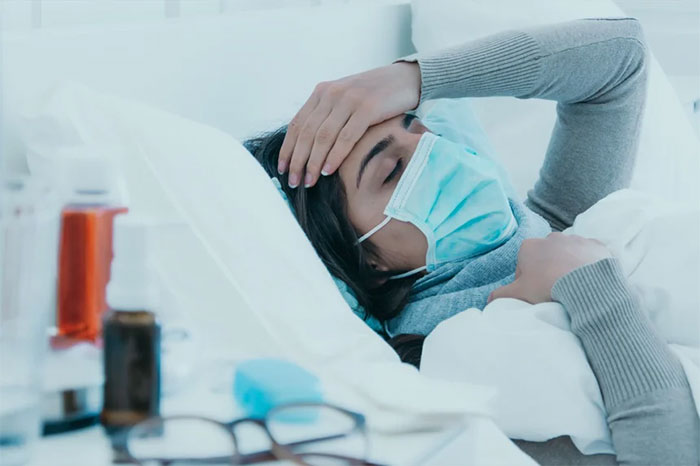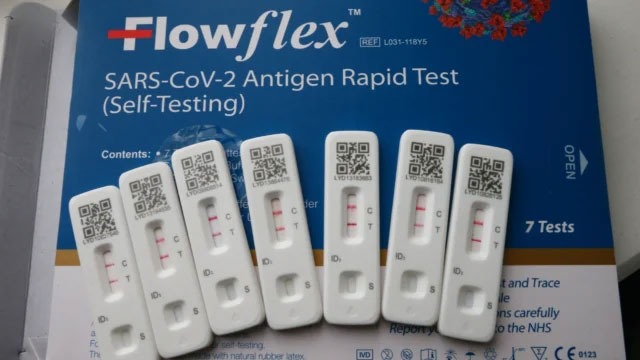More and more people are experiencing reinfection with Covid-19 just 1-2 months after recovery. Experts emphasize that it is possible to be infected with nCoV multiple times, and vaccination helps reduce the risk of severe illness.
In early January, the Guardian reported on the case of Mea Walton, a 20-year-old medical student in the UK, who contracted Covid-19 a total of four times. In September 2020, Walton discovered she had Covid-19 just before starting her studies. At that time, she was working part-time in a pub and always wore a mask.
During her second and third infections with Covid-19, the student felt uncomfortable due to a runny nose. However, by the fourth infection, a few days after testing positive, her symptoms resembled those of the flu.
Another case is Alon Helfgott, a 12-year-old boy from Israel who was infected with three different strains of nCoV: Alpha, Delta, and Omicron. During his Omicron infection, Alon’s health was not significantly affected, and he did not exhibit many symptoms. However, when infected with the Alpha variant, he experienced a high fever.
These cases have raised concerns about how high the risk of reinfection with Covid-19 is after recovery and how many times each patient can be reinfected with nCoV.

Antibodies from natural immunity and vaccines decrease over time. Therefore, all recovered Covid-19 patients are at risk of reinfection. (Photo: Freepik).
How Common is Reinfection with Covid-19?
According to the Centers for Disease Control and Prevention (CDC), reinfection with Covid-19 is relatively rare; however, research findings indicate that this trend is becoming more common.
Cnet cites information from the CDC indicating that the Delta variant is more transmissible and that the reinfection rate with this variant may be higher than with Alpha or other variants. The emergence of Omicron has further exacerbated this situation.
An analysis by the UK Health Security Agency (UKHSA) published in December 2021 found that one in ten people in the UK had an Omicron infection.
The study also indicated that antibodies from previous Covid-19 infections significantly weaken against the new variant. Omicron carries mutations that evade immunity from two vaccine doses or prior nCoV infections.
Another study in the UK from November 29 to December 11, 2021, concluded that recovered Covid-19 patients had only a 19% chance of resisting Omicron. This figure was similar for those who had received two doses of the Covid-19 vaccine, around 20%.
Additionally, booster shots are believed to provide 55-80% protection against symptomatic Omicron infections.
Why Do People Get Infected with Covid-19 Multiple Times?
In an article on The Conversation, Professor Paul Hunter from the University of East Anglia, an advisor to the World Health Organization (WHO), stated that the answer may lie in the fact that our immune response is often insufficient to prevent nCoV infection.
This could be due to the emergence of new variants like Omicron, which has many mutations that make it difficult for the immune system to recognize. In other words, the virus has bypassed the immunity established from previous infections.
The second possibility is that the immunity we gain from previous Covid-19 infections or vaccinations has waned. The solution to this is booster vaccinations.

The risk of reinfection with Covid-19 and severe illness during the second infection is reduced with vaccination. (Photo: Freepik).
When the virus enters the body, B and T cells work to combat the infection. Antibodies produced by B cells act as the front-line defense against infection and prevent infected cells, thereby protecting us from reinfection. Meanwhile, T cells destroy the infected cells.
Once the threat from the virus subsides, the T and B cells die off, and the level of antibodies decreases. Over time, as antibodies diminish, the opportunity for the virus to invade again increases, especially when it mutates as much as nCoV, which has many adaptive advantages over the body.
The virus continuously evolves and forms new mutations and variants. If a large portion of the population remains unvaccinated or lacks immunity, experts are concerned that vaccine-evading variants could emerge.
Additionally, nCoV almost always enters the body through the nose and throat. In contrast, immunity in the mucosal layer in these areas tends to last relatively shorter than systemic immunity.
This may also explain why the protective ability against severe illness, which usually originates from the lungs, lasts longer than the protection against the risk of infection.
How Soon After Recovery Can a Recovered Patient Get Infected Again?
A study in the UK involving 25,661 people from June to December 2020 showed that recovered Covid-19 patients had an 84% reduced risk of reinfection with nCoV in the following seven months. Less than 2% of volunteers tested positive for a second Covid-19 infection.
However, the emergence of new variants has gradually shortened the protective capabilities of antibodies from previous infections.
In October 2021, a study examining the likelihood of reinfection with different nCoV strains found that someone who had previously contracted Covid-19 could be reinfected within 3 months to 5 years if not vaccinated. The average duration was 16 months.
Nevertheless, some recovered patients may experience reinfection sooner, even just 1-2 months after recovery.
Professor William Schaffner from Vanderbilt University Medical Center in the US noted: “Some people believe that after recovering from Covid-19, you will be protected forever, like with measles. However, the viruses causing these two diseases are completely different. The protective ability against nCoV will naturally diminish over time.”
This means that each person can be reinfected with Covid-19 not just twice but multiple times.
A study conducted in October 2021 by the Yale School of Public Health showed that unvaccinated individuals would have immunity against reinfection for approximately 3-6 months. However, this data was calculated before the emergence of Omicron.
Currently, experts emphasize that there is not enough data to determine whether a recovered patient can be reinfected with Omicron multiple times.
However, the UKHSA confirms that this risk is entirely possible. Vaccination remains the best way to protect us from the risk of reinfection.
The CDC cites a study showing that unvaccinated individuals are twice as likely to experience reinfection compared to those who have been vaccinated against Covid-19.
Another study also indicates that unvaccinated individuals are five times more likely to be hospitalized if they contract Covid-19 for a second time.



















































